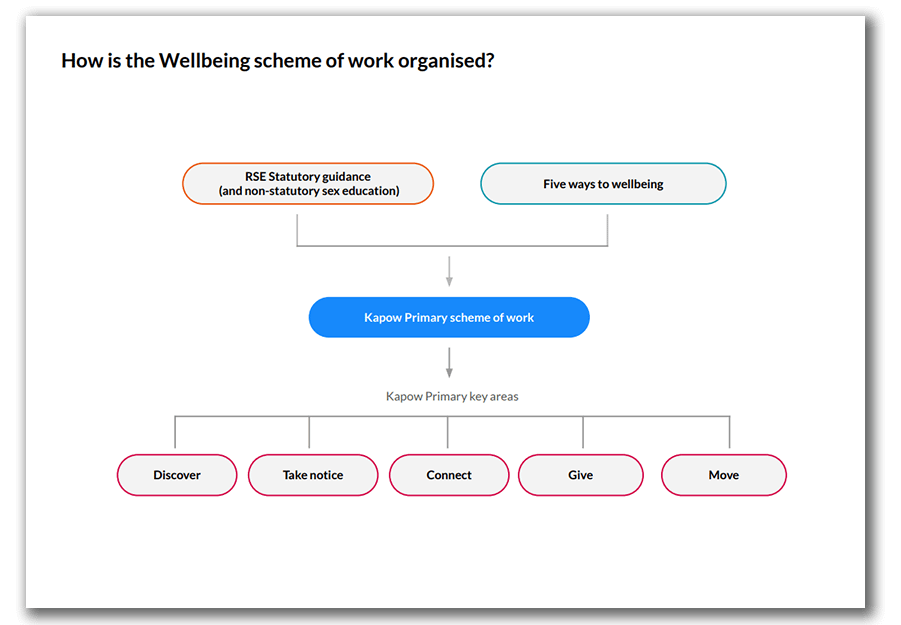An Introduction To The Kapow Primary Wellbeing Scheme Of Work
Written by Kapow Primary team
Published on 10th January 2025
Last Updated: 10th January 2025
Written by Kapow Primary team
Published on 10th January 2025
Last Updated: 10th January 2025

Kapow Primary Wellbeing is a comprehensive, fully resourced scheme designed to bring the benefits of mental wellbeing into the classroom. With its engaging lesson plans, high-quality resources, and integrated teacher support, the Wellbeing curriculum positively impacts both pupils and teaching staff.
Wellbeing lessons are based on five strands inspired by the NHS’s 5 Steps to Mental Wellbeing, adapted specifically for primary-age children. The five strands cover essential aspects of mental and physical wellbeing:
Each strand is revisited at an age-appropriate level through a spiral curriculum, ensuring consistent progression year after year. There is one lesson per strand per year group. For more information about how the Wellbeing curriculum is organised, see the Wellbeing long-term plan.

To support teachers in delivering lessons on Wellbeing, integrated CPD videos explain each strand and provide practical advice. These resources equip teachers with the knowledge and confidence to teach Wellbeing effectively and integrate it into their daily practice.
Schools can add the Wellbeing curriculum guide for parents and carers to their websites to provide extra guidance for parents.
In addition, the strategies within the lessons such as mindfulness techniques or prioritising physical activity can be applied by teachers themselves, contributing to improved staff wellbeing.
Kapow Primary Wellbeing lesson plans are clear and well-structured. Each lesson includes:
Resources, including videos, printable materials, and presentations make the scheme easy to integrate into any school’s curriculum. With strong cross-curricular links to Computing, Geography, Music, PSHE and Science, Wellbeing is seamlessly integrated into everyday learning.
The Personal development, SMSC, and British values mapping document highlights how the Wellbeing curriculum supports pupils’ spiritual, moral, social and cultural growth and respect for British values.
In a survey we carried out in December 2023, teachers praised the scheme’s accessibility and ability to engage children, describing it as “easy to navigate” and a “fantastic add-on” to their existing resources.
Watch the video to learn more about the Wellbeing scheme:
The Wellbeing scheme of work is free for all schools. It’s automatically included for all Kapow Primary subscribers, and non-subscribers can also sign up.
It’s flexible enough to be taught as a standalone unit or incorporated into a broader PSHE curriculum.
The scheme doesn’t just focus on pupils; it acknowledges the importance of staff wellbeing too. By prioritising teacher support, offering CPD opportunities, and integrating wellbeing strategies into the school day, Kapow Primary Wellbeing contributes to a positive school culture that benefits everyone.
For further teacher support, watch the webinar Enhancing Wellbeing for Pupils and Staff, in which a panel of experts shares insights and best practices on wellbeing.
Whether you’re looking to strengthen your school’s wellbeing provision or introduce it for the first time, Kapow Primary’s Wellbeing lessons provide everything you need to make a meaningful difference.
Explore the Wellbeing scheme today and join the growing number of schools prioritising mental health and wellbeing for all.